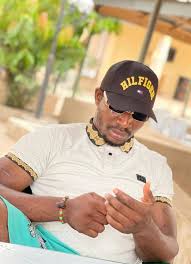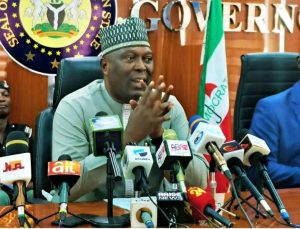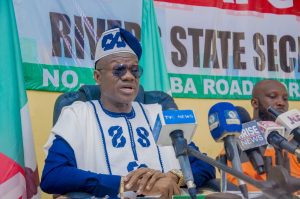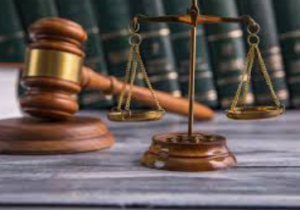•••Gov. AbdulRazaq seeks supports of residents, LGs on personal hygiene
•••FG lauds Gov’s political will, commitment to WASH campaign
Kwara State Governor AbdulRahman AbdulRazaq on Monday flagged off the ‘Clean Kwara’ Campaign in commemoration of Sustainable Development Goals (SDGs)’s fifth anniversary as part of the administration’s commitment to end open defecation and promote good hygiene in the state.
“This flag-off coincides with the 5th anniversary of the Sustainable Development Goals (SDGs). A key part of the SDGs, which is Goal 6, is general access to safe and affordable drinking water and access to adequate and equitable sanitation, hygiene for all, and end open defecation by 2030,” AbdulRazaq said during the event held in Ilorin, the state capital.
“Just like in many areas of human capital development indices, we met a state with appalling ratings in SDGs, including Goal 6:1 and 2 mentioned above. For instance, a national survey published in 2018 ranked Kwara State 30th among the 36 (thirty-six) states of the Federation in access to basic water and sanitation services. We were ranked 22nd in terms of access to basic water supply services. Going by that report, we are in the bottom three nationwide in access to sanitation services and among the states with highest prevalence of open defecation, and the poorest in North Central.”
A study by the Office of the Senior Special Assistant to the Governor on SDGs on public toilets and services at motor parks in the state showed that 95% of the latrines are dry pit while just 5% of them are pour-flush. The situation is grimmer with the healthcare facilities and hospitals because it was discovered that up to 90% of them lacked improved water supply with no hand washing facility, according to the Governor.
AbdulRazaq said inadequate access to quality water, sanitation and hygiene (WASH) services could negatively impact health, in addition to having huge socioeconomic consequences on any society and encouraged authorities at the local government level to also commit to these protocols.
“We saw this huge gap when we came in and that explains why we prioritised provision of water. That has led to the rehabilitation of several water works that had long collapsed. Today, we have made considerable progress,” he said, calling for partnership with the federal government and various development bodies to support the state,
For his part, the Minister of Water Resources, Engr Suleiman Adamu, identified Kwara as one of the states with highest number of open defecation practice in Nigeria – which is about 64% while only 14% of the population have access to basic sanitation services.
“This underlines the critical WASH situation in Kwara State. I am delighted to be part of this ground breaking event of Kwara Clean Campaign aimed at mobilising actions against open defecation and commemorate the beginning of a decade of actions of the Sustainable Development Goals. Water and sanitation for all is of interest and all the SDGs target as water is life and sanitation is dignity,” he said.
“Today’s event is a clear demonstration of the commitment needed to reverse the unpleasant situation. Kwara State is now listed among the first runner states to launch the state advocacy for clean and green campaign as advocated during the national launch of the campaign by the Vice President in November, 2019. The clean and green campaign is aimed at mobilising high level political support and resources of the entire populace towards building a new culture of sanitation.”
Senior Special Assistant to the President on SDGs, Princess Adejoke Orelope-Adefulire, who was represented by Dr. Ify Nnamchi-Ukaegbu, disclosed that the current statistics by the World Health Organisation and UNICEF’s Joint Monitoring Report show that one in every four Nigerians — about 47 million people — practices open defecation and that fewer than half of households in Nigeria have their own toilets.
“I am confident that with this flag off ceremony, Kwara State Government under the able leadership of His Excellency is on the right track towards the attainment of SDG-6. I therefore commend your tireless efforts and commitment at ensuring clean water and sanitation being used by all in Kwara State on or before 2030. My office will continue to support sub-national governments in ensuring the achievement of the SDGs in Nigeria,” she said.
“Indeed, it is exactly five years since President Muhammadu Buhari joined the world leaders to adopt the 2030 Agenda for Sustainable Development. The 17 SDGs (169 targets and 230 key performance indicators), envision a present and a future that is economically sustainable, socially inclusive and environmentally resilient with the principle of “leave no one behind.”
In her remarks, the Commissioner for Water Resources, Hajia Fatimah Lawal noted that the government prioritised provision of water which led to the rehabilitation of several water works that had long collapsed across the state.
Earlier, the Senior Special Assistant to the Governor on Sustainable Development Goals, Dr. Jamila Bio-Ibrahim, said her office had identified key areas of partnership in agriculture, water supply, clean energy, education to create SDGs community and end open defecation in the state.
Dr Bio-Ibrahim urged residents of Kwara to own and protect the campaign to end open defecation in the state.
“The open defecation and WASH campaign in collaboration with the ministry of water resources is our first intervention because it is a low hanging-fruit in the development of our state and it has multiplier effects on the health, well-being and socio-economic development of our people,” she said.
“We also believe that this will make immediate and important impact on the COVID-19 era as adequate water supply, sanitation and hygiene facilities are needed to curb coronavirus.”
The European Union Ambassador to Nigeria and ECOWAS, Ambassador Ketil Karlsen, and UNICEF representative thanked the Kwara State government for its political commitment to end open defecation in the state.
The event was attended by cabinet members, including Deputy Governor Kayode Alabi, community based organisations, representatives of development partners such as UNICEF, WaterAid, Organised Private Sector in WASH (OPS-WASH), Reckitt Benckiser, the Society for Water and Sanitation (NEWSAN), and Water Supply and Sanitation Collaborative Council (WSSCC).






